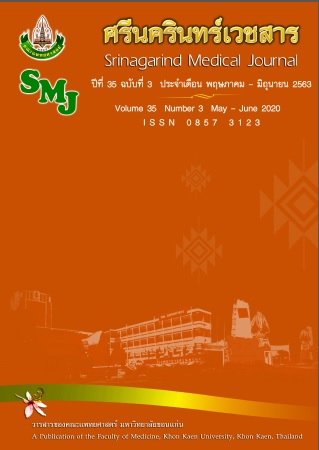Elevating the Autophagic Process by Balancing the Biological Clock
Keywords:
self-eating, biological clock, autophagy, การกินตัวเองของเซลล์, นาฬิกาชีวิต, ออโตฟาจีAbstract
การส่งเสริมกระบวนการออโตฟาจีด้วยสมดุลของนาฬิกาชีวิต
พิชามนชุ์ เพ็ชรฉวาง, วรศักดิ์ แก้วก่อง*
ภาควิชาชีวเคมี คณะวิทยาศาสตร์การแพทย์ มหาวิทยาลัยนเรศวร
ออโตฟาจี (autophagy) หรือการกินตัวเองของเซลล์เป็นกระบวนการที่เซลล์ใช้กำจัดองค์ประกอบของเซลล์ที่เสื่อมสภาพเพื่อป้องกันการทำงานที่ผิดปกติของเซลล์ ซึ่งจะก่อให้เกิดโรค โดยกระบวนการนี้มีส่วนเกี่ยวข้องกับนาฬิกาชีวิต ซึ่งเป็นวงจรที่ควบคุมระบบการทำงานต่าง ๆ ภายในร่างกายในขณะนอนหลับและตื่น นาฬิกาชีวิตจะกระตุ้นให้มีการหลั่งฮอร์โมนที่จำเป็นต่อการซ่อมแซมเนื้อเยื่อส่วนต่าง ๆ ในขณะเดียวกัน กระบวนการออโตฟาจีร่วมทำหน้าที่กำจัดของเสียที่สะสมไว้ เมื่อร่างกายอยู่ในสภาวะพักผ่อนน้อยหรือไม่เหมาะสมจนส่งผลกระทบต่อนาฬิกาชีวิต อาจเพิ่มความเสี่ยงต่อการเป็นโรคต่าง ๆ เช่น โรคของระบบประสาทและความจำ โรคเบาหวาน โรคไขมันพอกตับ โรคหัวใจและหลอดเลือด และโรคมะเร็ง เป็นต้น ดังนั้นการพักผ่อนที่เพียงพอและเหมาะสม ตลอดจนการเลือกรับประทานอาหารที่มีประโยชน์ร่วมกับการออกกำลังกายจะช่วยปรับสมดุลนาฬิกาชีวิตและช่วยกระตุ้นกระบวนการออโตฟาจีเพื่อกำจัดโปรตีนหรือเซลล์เสื่อมสภาพ นำไปสู่การมีสุขภาพที่แข็งแรง ลดความเสี่ยงต่อการเป็นโรคและการมีชีวิตที่ยืนยาว
Autophagy or self-eating is a cellular process that facilitates the elimination of deteriorated cellular components to prevent cellular dysfunction and disease development. This mechanism interrelates with the biological clock, the controlling system in the living organism through sleep-wake cycle. During sleep, biological clock stimulates tissue repairing hormone secretion, while the autophagy acts mainly on the clearance of metabolic wests. In the sleep deprivation state, the biological clock will be interfered and this could lead to several diseases such as neurodegenerative diseases, diabetes, fatty liver, cardiovascular diseases and cancers. Therefore, the healthy sleep habits combined with healthy diet and exercise will improve the biological clock and the activation of autophagy mechanism for better life and longevity.
References
Glick D, Barth S, Macleod KF. Autophagy: cellular and molecular mechanisms. J Pathol 2010; 221: 3–12.
Ma D, Li S, Molusky MM, Lin JD. Circadian autophagy rhythm: a link between clock and metabolism?. Trends Endocrinol Metab 2012; 23: 319-25.
Bareja A, Lee DE, White JP. Maximizing Longevity and Healthspan: Multiple Approaches All Converging on Autophagy. Front Cell Dev Biol 2019; 7: 183.
Madeo F, Tavernarakis N, Kroemer G. Can autophagy promote longevity?. Nat Cell Biol 2010; 12: 842-6.
Yu L, Chen Y, Tooze SA. Autophagy pathway: Cellular and molecular mechanisms. Autophagy 2018; 14: 207-15.
Yamada E, Singh R. Mapping autophagy on to your metabolic radar. Diabetes 2012; 61: 272-80.
Sil P, Wong SW, Martinez J. More Than Skin Deep: Autophagy Is Vital for Skin Barrier Function. Front Immunol 2018; 9: 1376.
Rabinowitz JD, White E. Autophagy and metabolism. Science 2010; 330: 1344-8.
Moulis M, Vindis C. Autophagy in Metabolic Age-Related Human Diseases. Cells 2018; 7: 149.
Fujikake N, Shin M, Shimizu S. Association Between Autophagy and Neurodegenerative Diseases. Front Neurosci 2018; 12: 255.
Ishida N, Kaneko M, Allada R. Biological clocks. Proc Natl Acad Sci U S A. 1999; 96: 8819-20.
Jenwitheesuk A, Nopparat C, Mukda S, Wongchitrat P, Govitrapong P. Melatonin regulates aging and neurodegeneration through energy metabolism, epigenetics, autophagy and circadian rhythm pathways. Int J Mol Sci 2014; 15: 16848-84.
Zee PC, Attarian H, Videnovic A. Circadian Rhythm Abnormalities. Continuum (Minneap Minn) 2013; 19(1 Sleep Disorders): 132-47.
Farhud D, Aryan Z. Circadian Rhythm, Lifestyle and Health: A Narrative Review. Iran J Public Health 2018; 47: 1068-76.
Maiese K. Moving to the Rhythm with Clock (Circadian) Genes, Autophagy, mTOR, and SIRT1 in Degenerative Disease and Cancer. Curr Neurovasc Res 2017; 14: 299-304.
Madeo F, Zimmermann A, Maiuri MC, Kroemer G. Essential role for autophagy in life span extension. J Clin Invest 2015; 125: 85-93.
Pietrocola F, Malik SA, Mariño G, Vacchelli E, Senovilla L, Chaba K, et al. Coffee induces autophagy in vivo. Cell Cycle 2014; 13: 1987-94.
Zhou J, Farah BL, Sinha RA, Wu Y, Singh BK, Bay BH, et al. Epigallocatechin-3-gallate (EGCG), a green tea polyphenol, stimulates hepatic autophagy and lipid clearance. PLoS One 2014; 9: e87161.
Hung JY, Hsu YL, Li CT, Ko YC, Ni WC, Huang MS, et al. 6-Shogaol, an active constituent of dietary ginger, induces autophagy by inhibiting the AKT/mTOR pathway in human non-small cell lung cancer A549 cells. J Agric Food Chem 2009; 57: 9809-16.
Tomas-Hernández S, Blanco J, Rojas C, Roca-Martínez J, Ojeda-Montes MJ, Beltrán-Debón R, et al. Resveratrol Potently Counteracts Quercetin Starvation-Induced Autophagy and Sensitizes HepG2 Cancer Cells to Apoptosis. Mol Nutr Food Res 2018; 62: 1700610.
Liu Y, Gong W, Yang ZY, Zhou XS, Gong C, Zhang TR, et al. Quercetin induces protective autophagy and apoptosis through ER stress via the p-STAT3/Bcl-2 axis in ovarian cancer. Apoptosis 2017; 22: 544-77.


